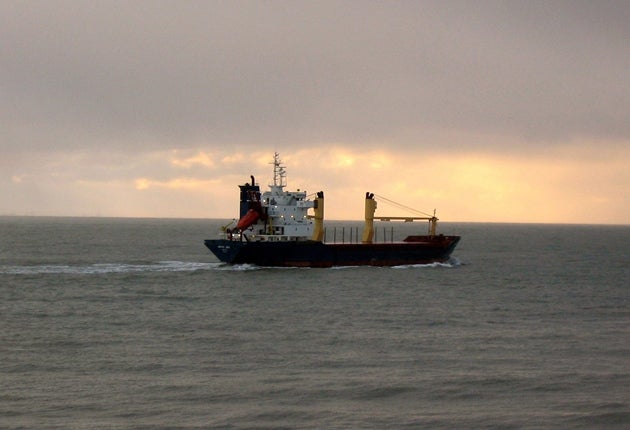Ransom demand for missing cargo ship
But neither the Russian navy nor Interpol are any nearer to solving the disappearance of the MV 'Arctic Sea'. David Randall reports

The owners of the missing vessel, the Arctic Sea, received a ransom demand for the safe return of the ship and its 15-man crew yesterday. The development was confirmed by Finnish police, who issued a statement saying that the case had now turned into one of "aggravated extortion and alleged hijacking".
But the ship's whereabouts are no nearer being solved. More than two weeks after losing contact with the rest of the planet, the MV Arctic Sea continued last night to defy attempts by the world's satellite systems, Interpol, the Russian navy and numerous security services to explain its meandering and mysterious voyage. Sightings off the West African coast of something that looked like the most wanted ship on the oceans had still, as of last night, to be confirmed. Earlier reports that it had been found, 500 miles north of the Cape Verde island of Sao Vicente, were doubted by Russian and European Commission sources. But the French navy said it believed the ship was still in that area, on a course set for Brazil.
The saga of the Arctic Sea – which has sailed under five different flags and as many different names since it was built in Turkey 18 years ago – began early last month. The vessel spent two weeks in dock in Kaliningrad, the Russian enclave on the Baltic famous for its smuggling activities. The local customs, a not entirely unbribable body of men, checked it before departure, and it then went to the Finnish port of Pietarsaari, where its cargo of $1.3m (£800,000) worth of sawn timber, destined for Algeria, was loaded. So far, so normal.
Having put to sea on 23 July, the Russian-crewed, Maltese-flagged and Finnish-owned ship had not gone far when, according to a belated radio message to its owners, it was intercepted off the coast of Sweden. As it sailed close to the islands of Oland and Gotland, it was approached at 3am local time on 24 July by a large black inflatable boat, which bore the legend "Polis", and contained eight to 10 men in uniforms and masks. They boarded the ship, said they were Swedish police, told the crew they were looking for drugs, and proceeded to interrogate and beat them up, some of them severely. They were said to speak English "with accents", and, after 12 hours, they departed landwards in their inflatable.
It was not until four days later that the crew reported this far-from-usual occurrence to the ship's managers. They contacted the Swedish authorities, who said that the men were no employees of theirs, and so, in due course, Interpol was informed.
By this time, the Arctic Sea had proceeded westwards, past Dover, where the British coastguard made routine contact with it. It was only after it was steaming out of the English Channel that reports was received from Interpol of the boarding in Swedish waters.
Attempts to make contact with the ship were not successful. A signal was last received well off Penzance on 30 July but the transmitter has either been turned off or damaged (perhaps by the black-clad boarders). After a confirmed sighting in the Bay of Biscay, and then near a lighthouse in Portuguese waters much later on 30 July, the Arctic Sea vanished.
Swedish police say that, on 31 July, they spoke briefly by telephone to a man who they were told was the ship's captain. For reasons that are unclear, they have refused to disclose the contents of this call.
A few days later, something of a media maroon went up and, in the absence of anything but the scantest of facts, speculation broke out involving anything (and everything) from piracy and arms running, to a dispute between the ship's owners and a third party, or even plutonium smuggling.
What we do know is this: the ship has 15 crew, all Russian, an experienced skipper in Captain Sergei Zaretsky, and food and fuel on board that could last until mid-September. It was due into Algeria on 4 August, and the Russian navy is actively seeking it, having dispatched a five ship squadron from the Mediterranean on Tuesday. The reported sighting, 500 miles north of Sao Vicente, came on Friday. But no direct contact has so far been made with the Arctic Sea. Unfortunately, the ship is of a design almost ubiquitous on the world's oceans. While 98m long, and therefore large enough not to be mislaid, it is about as distinctive on the seas as a white van is on the streets.
On Friday, a European Commission spokesman said that radio calls indicated the ship had been attacked for a second time off the Portuguese coast. This, if true, suggested it was either being dogged by successive bands of brigands, or some of the original attackers had remained on board. Then again, the reports may have been part of a smokescreen designed to disguise the intention of whoever is now in control of the Arctic Sea.
Join our commenting forum
Join thought-provoking conversations, follow other Independent readers and see their replies
Comments